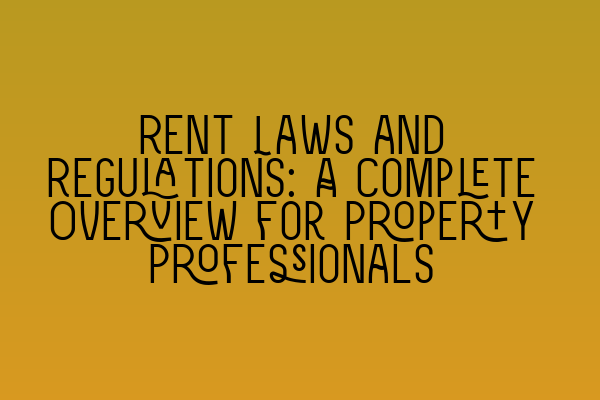Rent Laws and Regulations: A Complete Overview for Property Professionals
Rent laws and regulations play a crucial role in the property industry, governing the rights and responsibilities of both landlords and tenants. As a property professional, it is essential to have a comprehensive understanding of these laws to ensure compliance and facilitate smooth transactions. In this article, we will provide a complete overview of rent laws and regulations, covering key aspects that every property professional should be familiar with.
1. Residential Tenancies Act
The Residential Tenancies Act is one of the significant legislations governing rental properties. It establishes the rights and obligations of landlords and tenants in residential tenancies. The act provides guidelines for rent increases, security deposits, eviction processes, and other essential aspects of renting a property. Understanding the Residential Tenancies Act is vital for property professionals to protect the interests of their clients and to ensure a fair and lawful renting process.
For further details about the Residential Tenancies Act, you can refer to this article on SQE 1 Practice Mocks FLK1 FLK2.
2. Housing Act
The Housing Act is another critical legislation that property professionals need to be familiar with. This act outlines the legal framework for social housing, and it covers various aspects such as rent control, affordable housing schemes, tenant rights, and the responsibilities of local authorities in providing housing assistance. Familiarizing yourself with the Housing Act will enable you to navigate the complexities of social housing and provide valuable advice to clients involved in such arrangements.
If you are preparing for the SQE 1 exam, you may find this article on SQE 1 Practice Exam Questions helpful.
3. Assured Shorthold Tenancies
Assured Shorthold Tenancies (ASTs) are the most common type of tenancies in the private rented sector. Property professionals handling residential properties must have a thorough understanding of ASTs, their creation, termination, and legal implications. ASTs provide specific rights and responsibilities for both landlords and tenants, including notice periods, deposit protection, and grounds for eviction. It is essential to stay up-to-date with the latest changes in AST regulations to ensure compliance with the law.
To enhance your understanding of property law, you may want to explore SQE 1 and SQE 2 preparation courses available at SQE 2 Preparation Courses and SQE 1 Preparation Courses.
4. Rent Increase Regulations
Rent increases can be a sensitive subject for both landlords and tenants. Property professionals should be aware of the regulations in place regarding rent increases to prevent any violations and disputes. Different jurisdictions may have specific rules and procedures for rent increases, including notice periods and maximum allowable increases. Familiarize yourself with the rent increase regulations applicable in your area to ensure that your clients comply with the law while maintaining a fair and profitable rental property.
If you are looking for information about SRA SQE exam dates, you can check this article on SRA SQE Exam Dates.
5. Eviction Processes
Eviction is an unfortunate but sometimes necessary aspect of property management. Property professionals must understand the legal procedures and grounds for eviction to protect the rights of their clients and ensure a smooth process. Different jurisdictions may have variations in eviction processes, including notice periods, required documentation, and court proceedings. It is crucial to stay updated on the specific laws governing eviction in your area and provide accurate guidance to your clients.
As a property professional, keeping yourself informed about rent laws and regulations is vital for the successful management of rental properties. It is also crucial to constantly update your knowledge as regulations and legislations evolve over time.
Remember, compliance with rent laws not only protects the interests of landlords and tenants but also establishes trust and credibility for property professionals in the industry. By staying up-to-date with the latest regulations and continuously enhancing your expertise, you can excel in your profession and provide top-notch service to your clients.
